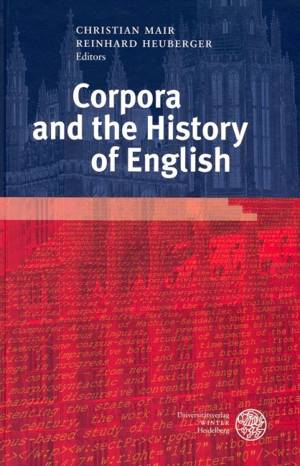
- Retrait gratuit dans votre magasin Club
- 7.000.000 titres dans notre catalogue
- Payer en toute sécurité
- Toujours un magasin près de chez vous
- Retrait gratuit dans votre magasin Club
- 7.000.0000 titres dans notre catalogue
- Payer en toute sécurité
- Toujours un magasin près de chez vous
Corpora and the History of English
Papers Dedicated to Manfred Markus on the Occasion of His Sixty-Fifth Birthday
53,45 €
+ 106 points
Description
Over the past two decades, digital corpora have changed the face of English historical linguistics. To honour Manfred Markus, compiler of ICAMET (the Innsbruck Computer Archive of Machine-Readable English Texts) and pioneer historical corpus linguist, the present volume brings together an array of twenty-one corpus-based studies of aspects of the history of English which is impressive both in its time-depth - from Old English to change in progress now - and in its broad range of the linguistic topics covered - from new findings in the already well-studied areas of morphosyntactic and lexical change to ground-breaking work on changing discursive conventions and stylistic norms of propriety. Representing the state of the art in the field at the beginning of the 21st century, the work will remain an important reference for the corpus-based study of the history of English for a long time.Table of Contents: Preface - Tabula Gratulatoria - Böker, Uwe: The recalcitrant corpus of the eighteenth-century canting crew: "marginal language of marginal people" or history from below and within? - Cordery, Leona F.: A corpus of Medieval English crusading literature: in search of an identity. - Diller, Hans-Jürgen: The decline of the family of m?d: ICAMET and other corpora. - Dossena, Marina: 19CSC, ICAMET and the diachronic study of specialized discourse in correspondence. - Esser, Jürgen: Stylistic change across generations: conflicting evidence from psycholinguistic and corpuslinguistic data. - Fries, Udo: 'Tis said, the apostrophe, and the importance of Innsbruck in Early English newspapers. - Ganner, Heidi: When a boy is not a boy.: reflections on the deceptive simplicity of the English language. - Gotti, Maurizio: SHALL and WILL as third person future auxiliaries in Early Modern English. - Heuberger, Reinhard: The role of computer corpora in EFL lexicography. - Hickey, Raymond: Productive lexical processes in present-day English. - Kettemann, Bernhard: Morphologische Integration von und semantische Differenzierung durch Anglizismen im Deutschen. - Kienpointer, Manfred: Emotion terms in the recent history of English. - Knappe, Gabriele: Peter Mark Roget's Thesaurus of English Words and Phrases: a mid-nineteenth century example of the place of phraseology in the history of linguistic theory and practice. - Kohnen, Thomas: Variability of form as a methodological problem in historical corpus analysis: the case of modal expressions in directive speech acts. - Mair, Christian: Inflected genitives are spreading in present-day English, but not necessarily to inanimate nouns. - Moessner, Lilo: The subjunctive in Early Modern English adverbial clauses. - Onysko, Alexander: Anglicisms in Der Spiegel: towards a methodological framework of corpus analysis. - Peters, Hans: Getting smart. - Tani, Akinobu: Thesaurus of Old English for Early Middle English: an analysis in light of word pairs in the "Katherine Group" lives. - Viereck Wolfgang: An atlas of English family names. - Weinstock, Horst: Vices and Virtues: Ein mittelenglisches Corpus um 1200. - Contributors - Appendix: Scholarly publications by Manfred Markus XXXX-2005.
Spécifications
Parties prenantes
- Editeur:
Contenu
- Nombre de pages :
- 358
- Langue:
- Anglais
- Collection :
- Tome:
- n° 363
Caractéristiques
- EAN:
- 9783825351588
- Format:
- Livre relié
- Dimensions :
- 165 mm x 245 mm
- Poids :
- 732 g

Les avis
Nous publions uniquement les avis qui respectent les conditions requises. Consultez nos conditions pour les avis.





